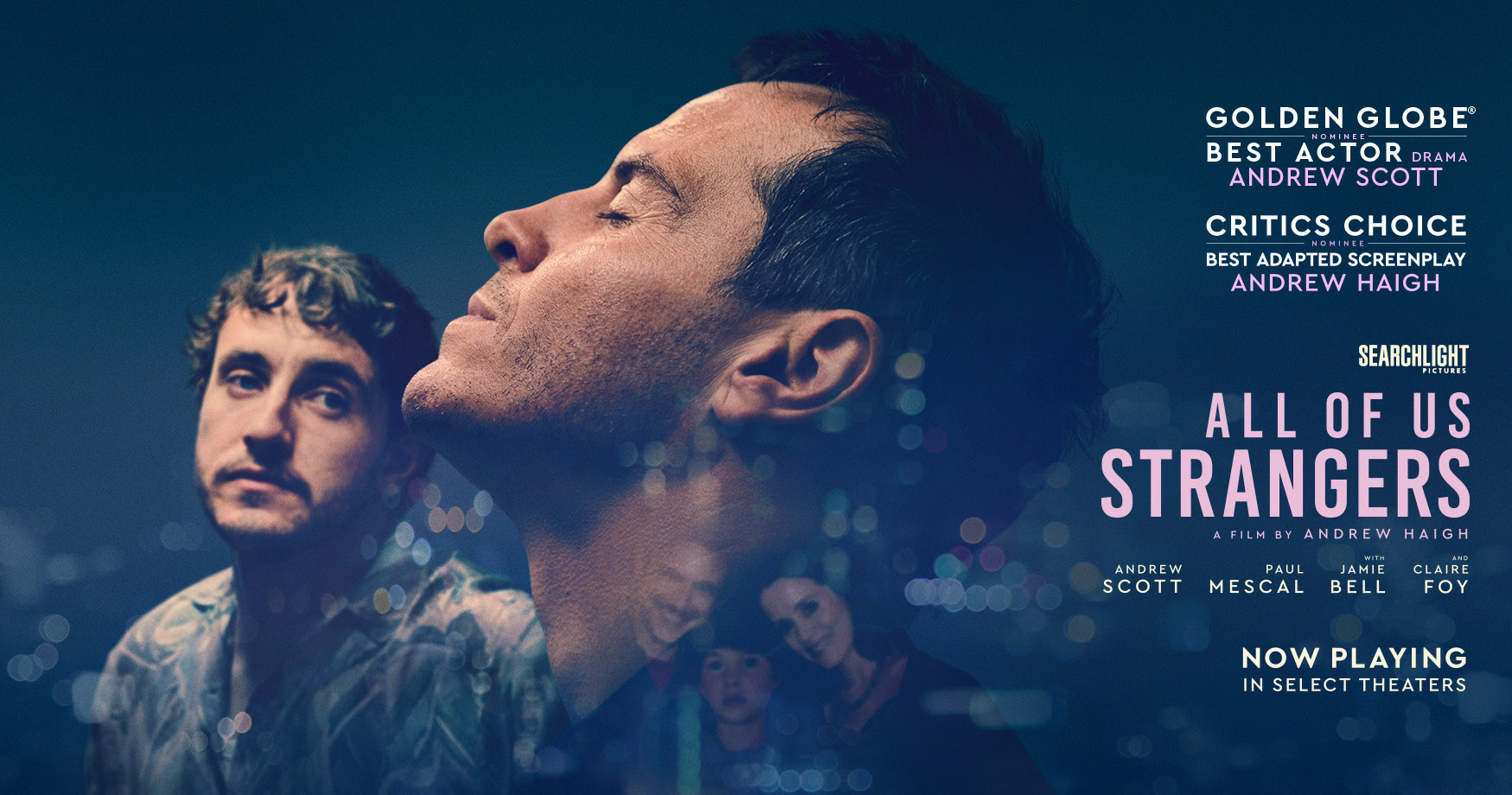British director Andrew Haigh first rose to prominence in 2015 with “45 Years,” in which veteran actors Charlotte Rampling and Tom Courtenay played an elderly couple dealing with his long-ago pre-marriage relationship with a young lady who died. Letting go of the past enabled the couple to move on with their own relationship, even given the long span of intervening years.
Now Haigh trods similar ground with his latest effort, the critically acclaimed (but very poorly titled) “All of Us Strangers,” in which Andrew Scott plays a mid-forties gay man named Adam, who is unable to make any sort of personal connection until and unless he deals with his own past. You see, Adam, an only child, was orphaned at age twelve when his parents were killed in an automobile accident.
Adam visits the suburban London house in which he grew up only after being approached by Harry, another gay man in his underoccupied downtown London apartment tower. Here he “meets” his parents – exactly as they were when Adam was twelve. Though his current age is never mentioned, the assumption is that the parents died about 30 years ago. As their presence in this film is (presumably) a figment of Adam’s imagination, the parents (Jamie Bell, and an absolutely perfect Claire Foy) do not appear surprised with his visit. In fact, they question why he hasn’t dropped in sooner.
During Adam’s initial visit, he announces he has become a motion picture screenplay writer – prompting an, “I knew you’d be successful” response from his mother. Much of this meeting is consumed with humorously updating the parents on how things have changed. Adam doesn’t even have a chance to broach the subjects of social media and cell phones. He’s too busy explaining that society has (for the most part) lost its stigma against gay people, and that AIDS is no longer considered a death threat. As Adam’s sojourns continue, discussions dig deeper and reveal feelings and intimacies that are the heart of “All of Us Strangers.”
Simultaneously, Adam’s relationship with Harry (Paul Mescal) blossoms, but only at the deliberate pace which Adam will allow. The more resolution he gains from his parents, the more he is able to open up to what we are led to believe is the first close relationship of Adam’s life. And this is the point of “All of Us Strangers.” In each of our lives, we must deal with loss. We must deal with the loss before we can move on to change – be that unwarranted change or planned change. In this respect, “All of Us Strangers” is a fascinating character study, and Scott (“Denial,” “1917”) guides us through it adroitly.
Fortunately, Haigh (who adapted Taichi Yamada’s novel “Strangers”) doesn’t pepper us with a lot of psychological dialogue. We are expected to draw the proverbial lines ourselves to equate the parental encounters with the new personal relationship. The fact that the relationship is gay is almost immaterial to the plot. “All of Us Strangers” would have worked equally as well with a heterosexual affair.
For that matter, Haigh doesn’t pepper us with a lot of anything. The verbal communication between Adam and his parents is compelling, but Adam and Harry don’t share much. Their attraction is physical at first, and only late in the film do the two lovers begin to share a little backstory.
Meanwhile, the Jamie D. Ramsay cinematography is primarily shot in extreme close-up, with few establishing shots. We feel like we are one with Adam, as opposed to observing him from a comfortable distance. Again, this technique takes the place of the overly “active” dialogue which dooms all too many “preachy” films. Kudos to Haigh for utilizing cinematic method to enhance our understanding of his characters.
Now having heaped praise upon one of this year’s most unique films, I must offer the caveat that “All of Us Strangers” is not as great as much of its pre-release buzz. Some critics have gone so far as to consider it 2023’s best film. While I agree that this one is true to its form throughout, I don’t rank it as strong as, say, “American Fiction,” which suffers from a weak ending, but is a much more enjoyable film experience throughout.
I’ll produce my own Top Ten list in a couple weeks, and fully expect to have “All of Us Strangers” as one of the year’s best. But it simply does not rank in the very top eschelon, because it’s difficult for us to connect with any of the characters. I think this is why Claire Foy comes off best here – because we instantly relate to her as a mother taken from her son’s life far too soon. She’s curious about his life, but realizes he needs to let go of her before he gains the ability to move on.
“All of Us Strangers” is a very strong film, although its deliberate pace and lack of action (or even simple plot developments) will drive away some viewers. I wouldn’t call this a great film, but it’s certainly unique, and unafraid to take chances. And for that, I am always appreciative.





